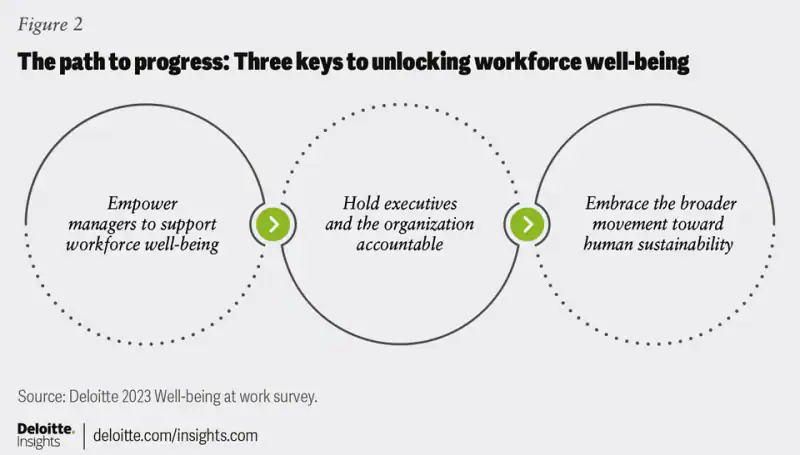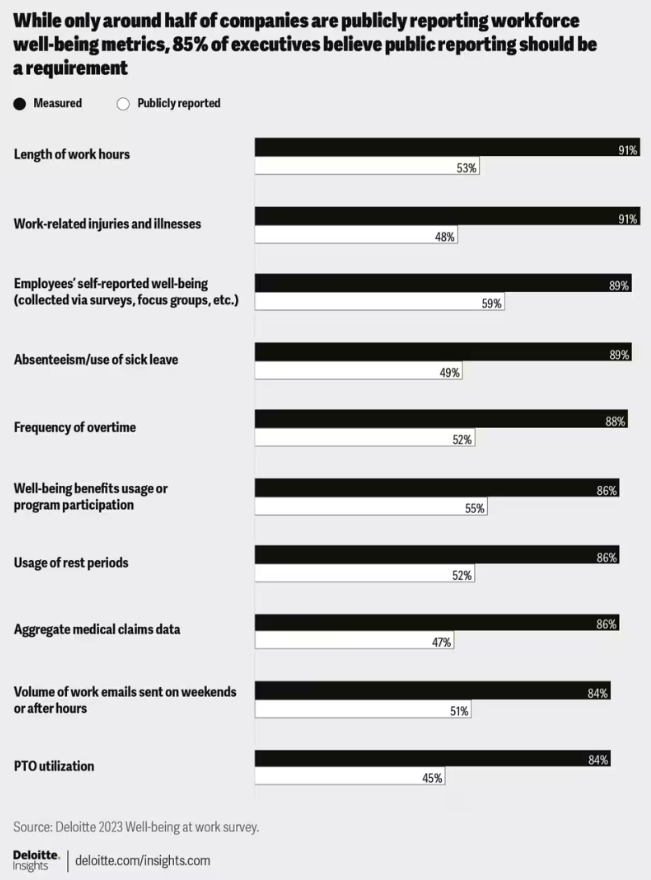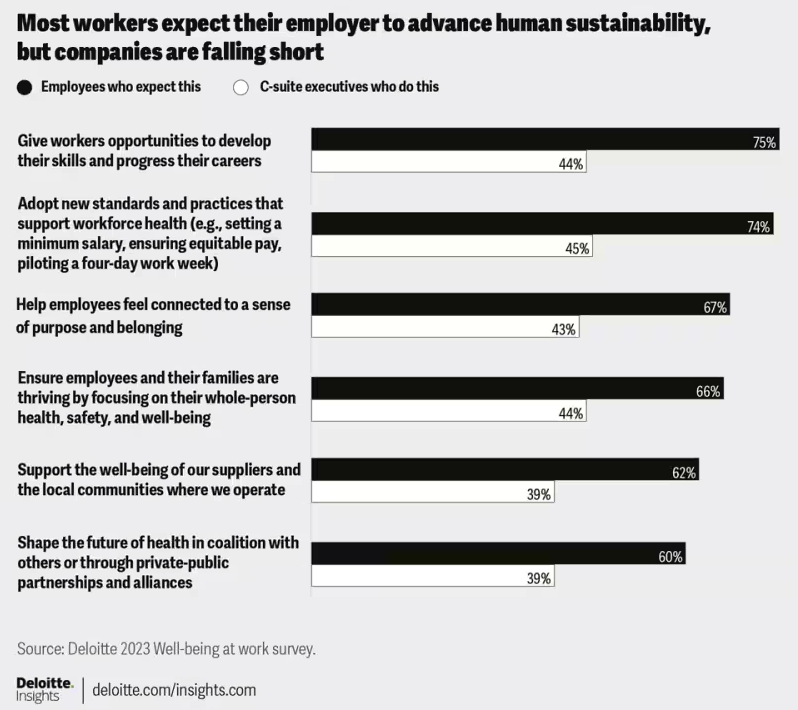As workforce well-being dips, C-suite considers ways to support managers and employees, finds Deloitte survey

Survey conducted by Deloitte and Workplace Intelligence finds that 85% of the C-suite say companies should be required to publicly report their workforce well-being metrics, but only around 50% report doing this
Global financial services provider Deloitte recently released a new report in collaboration with independent research firm Workplace Intelligence that explores why organizations are generally struggling to improve workforce well-being and what it could take to finally make progress on this important issue.
Now in its second year, the survey revealed that employee well-being has worsened across all dimensions. For employers, the path forward will likely require a strong focus on delivering immediate impact but ultimately should shift toward a more long-term view — one that prioritizes people over profits. To achieve this, leaders should increase their support for their managers, and they also should hold themselves and their organizations more accountable.
Fortunately, the C-suite executives surveyed are largely on-board with taking more ownership around matters of well-being. In fact, 85% feel organizations should be required to publicly report their well-being metrics, for example in their annual reporting. However, only around half say their company is currently doing this. Some employees reported that executives were not meeting their expectations when it comes to advancing human sustainability, which Deloitte defines as the long-term, collective well-being of individuals, organizations, climate, and society.
The report, Advancing Workforce Well-being, sheds light on what leaders should do to help move the needle on workforce well-being, digs into the role that managers and executives should play, and discusses why human sustainability should be part of the long-term solution.
Key findings from the report include:
- Workforce well-being is declining, but, in general, employees feel that some executives don’t recognize this. Most employees feel their health worsened or stayed the same last year — only around one-third say their health improved. However, more than 3 in 4 C-suite leaders believe their workforce’s health improved.
- For some, work remains an obstacle to well-being. Eight in 10 respondents are struggling to improve their well-being, with a heavy workload and stressful job topping the list of obstacles they face. The result is that compared to last year, an even greater number of people — 60% of employees, 64% of managers, and 75% of the C-suite — say they’re seriously considering quitting for a job that would better support their well-being.
- Managers can play a pivotal role in employee well-being, but they’re lacking organizational support. Seven in 10 managers say obstacles like rigid company policies, a heavy workload, and an unsupportive workplace culture prevent them from doing more to support their team members. Only 42% feel completely empowered to help their company achieve its well-being commitments.
- Executives generally agree they should be more accountable. A full 85% of the C-suite say they’ll become more responsible for workforce well-being over the next few years. Notably, 78% feel their company’s leaders should step down if they can’t maintain an acceptable level of workforce well-being, and 72% believe executives’ bonuses should be tied to workforce well-being metrics.
- Greater accountability should go hand-in-hand with public reporting. Fully 85% of executives believe organizations should be required to publicly report their workforce well-being metrics, but only around half are currently doing this. And while 84% of the C-suite Deloitte surveyed say their companies have made public well-being commitments, just 39% of employees feel the same way about their companies, indicating that leaders should elevate the visibility of these initiatives.
- Human sustainability is a way forward, but companies should step up their efforts. Organizations that are embracing this concept may be helping their employees become healthier, more skilled, and more connected to a sense of purpose and belonging, and they can also be supporting their suppliers and communities. However, while 89% of the C-suite say their company is advancing human sustainability, just 41% of employees agree.
With employee well-being worsening, it’s clear that organizations may be at a turning point right now, says Deloitte. If they don’t act, workforce well-being may continue to decline, which could have a negative impact on retention for employees, managers and executives.
Leaders have an opportunity to meet the moment and rewrite this story for a better tomorrow — not only for their employees, but for themselves as well. They should take greater accountability around matters of health and embrace a focus on human sustainability, and they should also do more to empower their managers. It may not be easy, but with the right support and the right mindset, real change could be possible, adds Deloitte.
Leaders should be immensely concerned that work continues to be the primary reason why people are both physically and mentally unwell. Employees need to be able to take time off and disconnect, and they shouldn’t be in a constant state of stress and exhaustion due to their jobs. Work can and should be compatible with well-being — and it’s up to leaders to deliver on that promise.
Dan Schawbel, managing partner at Workplace Intelligence
Organizations have much to gain from metrics that can help them better understand and communicate about worker well-being. The majority of the leaders surveyed agree that sharing this information could build employee trust and help them attract talent. And while publicly disclosing these metrics may seem radical, it has a precedent with the evolution of environmental, social and governance (ESG) reporting.
Jen Fisher, Deloitte’s U.S. chief well-being officer
Our understanding of what it means to create and sustain value is shifting. We’re beginning to see how economic value is fundamentally intertwined with employee well-being and quality of life, and that’s why human sustainability should be at the top of every corporate agenda.
Paul Silverglate, U.S. Executive Accelerators leader and Deloitte LLP’s technology sector vice chair
Research findings are based on a survey conducted by Deloitte and Workplace Intelligence in March 2023 among 3,100 employees, managers and C-level executives across the U.S., U.K., Canada and Australia.
For more insights, access the full Advancing Workforce Well-being report from Deloitte.


